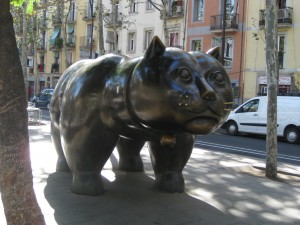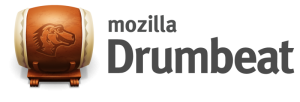Barcelona is the perfect location for the Mozilla Drumbeat Festival. With attendees are from around the world, you get the sense of “otherness” and “innovation” by the city and the Raval location.
Raval is a revived district. The Barcelonian city government situated the MACBA (Museum of Contemporary Art of Barcelona) in this area to drive change. How appropriate! Today I adventured in the city with a 3-hour bike tour of various regions. It started in Raval around 11:30am. The MACBA site was just starting to see an influx of Mozillians, Drumbeaters and, best of all, tents which signify a real festival happening. The bike tour took us to the symbol of Raval: a cat. (sculpture by Fernando Botero)

After the tour, I stopped by the MACBA site again. It was 4:00pm and the registration desk was close to ready. I returned at 5:30pm and the vibe was incredible:
Skateboards, Mozillians, Drumbeaters, a Hackbus in the centre, tents, a registration desk with people milling near.
If only we had set up a timelapse camera in the MACBA square to capture the day’s evolution as the Drumbeat Festival kicked off. Incredible. Exciting. We are all here as the change in the place of change. It is such a convergence of like and unlike minds of many disciplines. The common thread is an open mind and spirit to bounce ideas and energy.
By 8:30pm, the Joi Ito was on stage telling us that “the Internet saved my life.” He captured the spirit of Drumbeat for me. Each of us has a corner of open web and open education. We converge. And, he was right on point for me. The Internet has saved my me and changed my life in immeasurable ways.
The Science Fair was so engaging. What a great opportunity to share ideas about open education with each of our organizations. I was happy to share the CrisisCommons story. Every conversation had my head spinning with ideas and questions. It My only regret is that I was so busy at my table that I was unable to tour and meet the other Fair participants.
Here’s to another amazing day.


